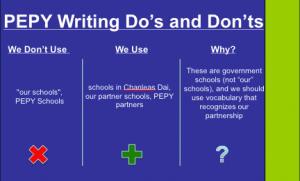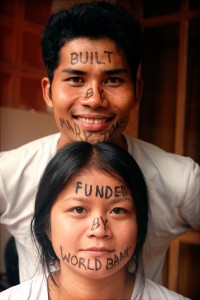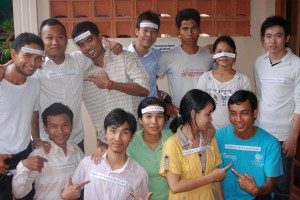Join the discussion on Social Edge about voluntourism and how to “do it right”.
I argue, that “doing it right” means not coming into a place to “volunteer” in the first place, but to learn and to share mutually. “Learning service” rather than “service learning” is what we should teach our students to seek out when they visit a new place.
In this post, Saul Garlick starts out by asking, “What would you say if I told you that all of the work that Westerners do in the developing world for less than 6 months amounts to nothing more than poverty tourism?”
I am pasting my comments below, but click here to read the whole chain of the debate!
—
Thanks for starting this discussion, Saul. I disagree with the premise of the question though: it is not the timeline that we should be focusing on. To establish more effective cross cultural understanding, we need to go somewhere to LEARN first, not to SERVE a people and a place we know little about.
Trying to give a timeline to when voluntourism becomes “effective” is like saying “You will gain more muscles if you work out for 60 minutes than 10 minutes”. If your goal is gaining more muscles, it’s not about the time, but about WHAT you are doing for that time period – are you lifting weights or doing jumping jacks?
I have lived in Cambodia for five years and I have seen way too many people who have stayed for 6 months or longer to “volunteer” but who would have had a better impact on the world had they gone home after a week. It is NOT the time that matters. What matters is what you are doing, how what you are able to contribute matches with needs, and how your time is structured so that you are not leaving a hole but rather building a bridge for when you do leave.
Cambodia, and other countries like it, do not need more rich tourists who want to (and I quote from many an email request that I get from teachers or parents) “paint something, spend time with kids, or build something so that they can really feel a sense of accomplishment for their time there.” If you are coming to paint or pet kids (I was thinking, “painting kids” tours might work very well given the high demand for both), it does not matter if you are here for a week or 6 months: you might be helping YOU, but your main impact is not helping others.
As you note Saul, a two-way dialogue is important, and that is why we have a problem implicit in the world voluntourism. What you are talking about – a two-way chance to learn – is not about “service”, it is about “learning”. Schools these days are removing the word “volunteering” from their international itineraries and replacing it with “Service Learning” as they are starting to realize it needs to be about learning. I think we need to take it a step further and flip the words to “Learning Service.”
We have to learn before we can help. As I’m sure you would agree, that advice is just as true for the budding “social entrepreneurs” heading off for 6 months to “teach” people from a foreign culture about something they decided would be a good solution for “their needs”. I know, because I have done this myself. 6 months or 2 days, it’s about listening, learning, and knowing our place – as at the end of the day, it IS tourism. You are visiting a new place for the first time, and you should be there to receive an education about a new place, new people, and new culture. We are the ones being served via new knowledge. With this new knowledge we can then move on to get angry, get interested, and take action, starting most likely with changes to our own lives.
I come from this from two perspectives: running an educational development organization working in 10 rural schools which constantly get requests from those looking to volunteer, and from running an educational tour company designed to offer travelers a chance to learn about development issues. We don’t take volunteers to come work in our school programs – those programs are managed by our Khmer staff – but we do take short-term travelers on learning adventures which fund our educational program work.
We have made changes at PEPY Tours as we went from offering people one-off voluntourism trips designed to “help people” to edu-tourism trips designed to change the way travelers give, travel, and live after they join us. Here is a piece I wrote about that transition: http://travelanthropist.com[…]rips-over-giving-trips.html
As we had gotten so fed up with the negative impact of voluntourism work here in Cambodia, through both our own mistakes and those of others, we decided to create a Voluntourism101 self-check guide for operators (though there is still more work to do on this to make it more effective and spread its use further – and I’d love your thoughts on this Saul).
http://voluntourism101.com/guide
Conversely though, I do think I think there is a need for a way to accelerate the understanding of needs to be matched with short-term travelers’ skills. For example, at PEPY, if someone was an expert at Joomla!, or Salesforce, or was willing to do a short training on US tax accounting, we could use their skills for even just a half of a day and be better able to solve our problems in the future. Some friends and I have been talking about creating a program where a select number of local social-entrepreneurs would be selected for a fellowship period and they could self-identify skills they want to learn (business plan writing, etc) and these could be listed for travelers to then “apply” to fill during their short-term stay. In exchange, they would get a chance to learn about a new culture from a socially conscious leader who might offer a cultural tour, a language lesson, etc. It’s like Couchsurfing meets Kiva/Kickstarter – but with a human time investment focus and cultural exchange rather than start up funding or loans. (If you are interested in this, be in touch.)
Finally, I’d like to point out that when we say “A two-way dialogue is essential between the social entrepreneur and the poor” we are implying that the social entrepreneur ISN’T “the poor” and herein lies another problem. The most effective leaders for a cause will be those whose problem is their own. We should be focused on helping local social entrepreneurs solve their own problems, as they are the ones who have already done the “learning” – they know what the needs are and are going to be the most passionate about making changes. Travelers who go and spend 2 days or 2 years learning from a local leader who is passionate about taking action to improve their own country will be better for it and can then find ways to contribute to that social entrepreneur’s needs. It’s not about time. It’s about the how and what, and as always, no matter how fun painting kids seems to some, it’s about investing time in people.






